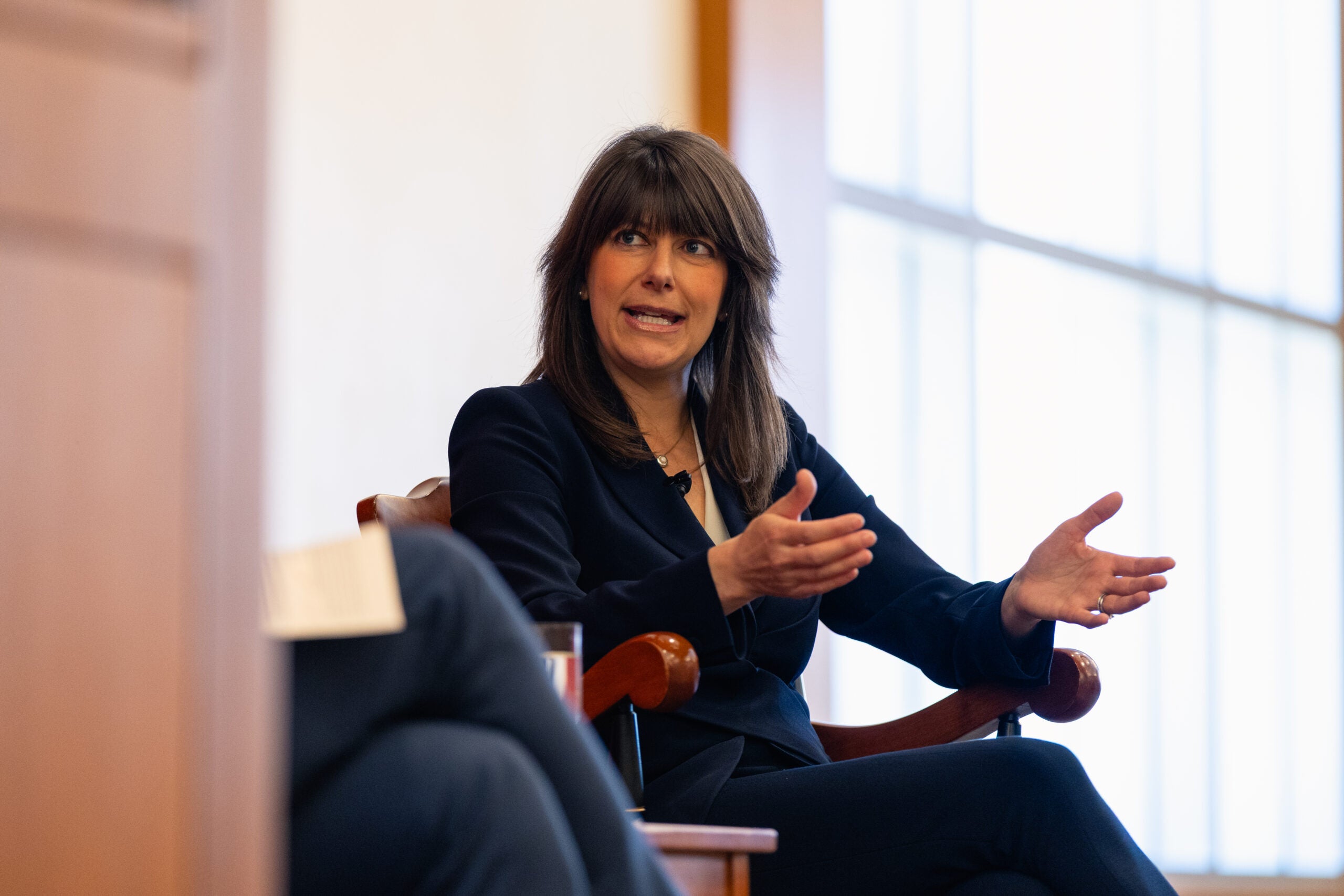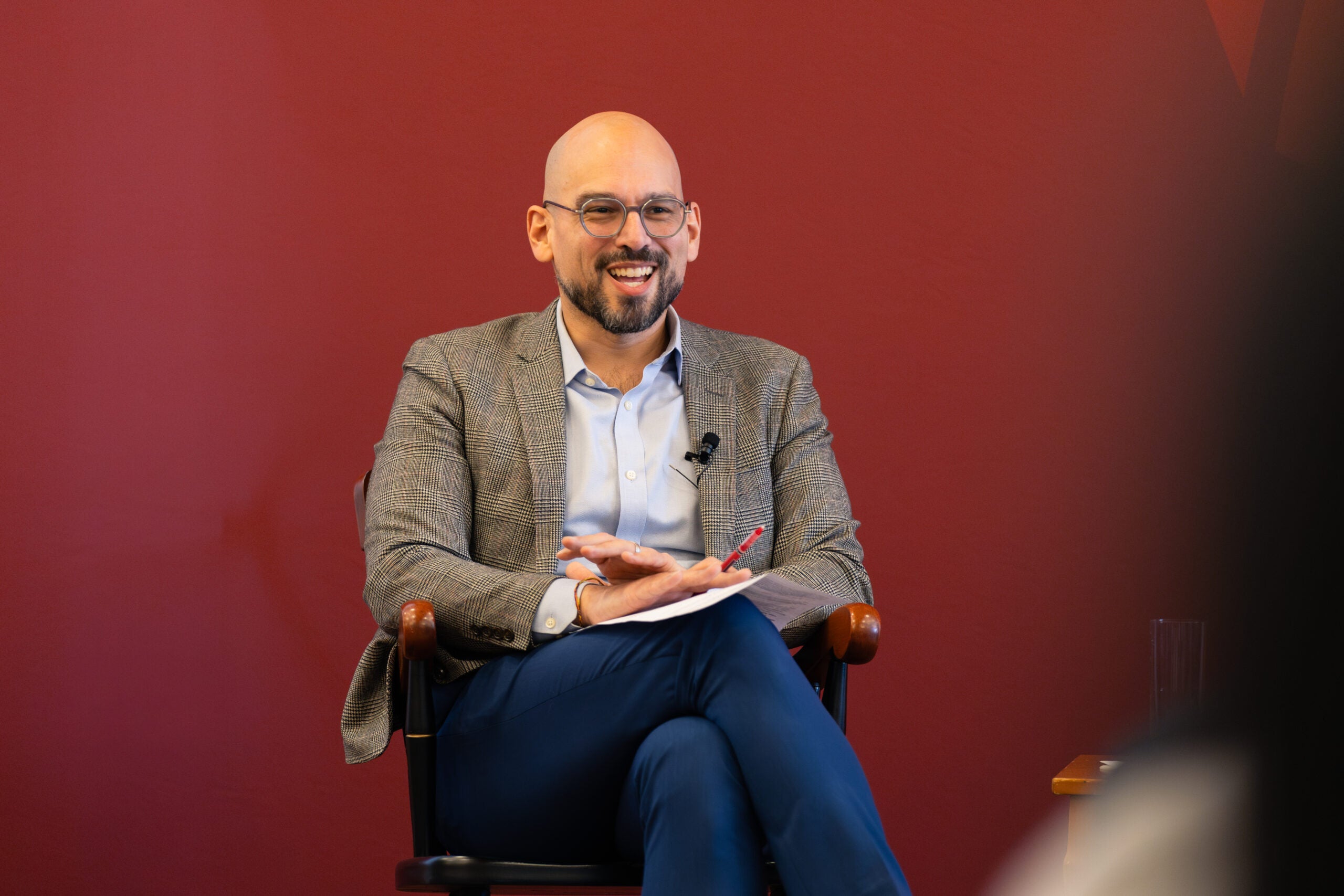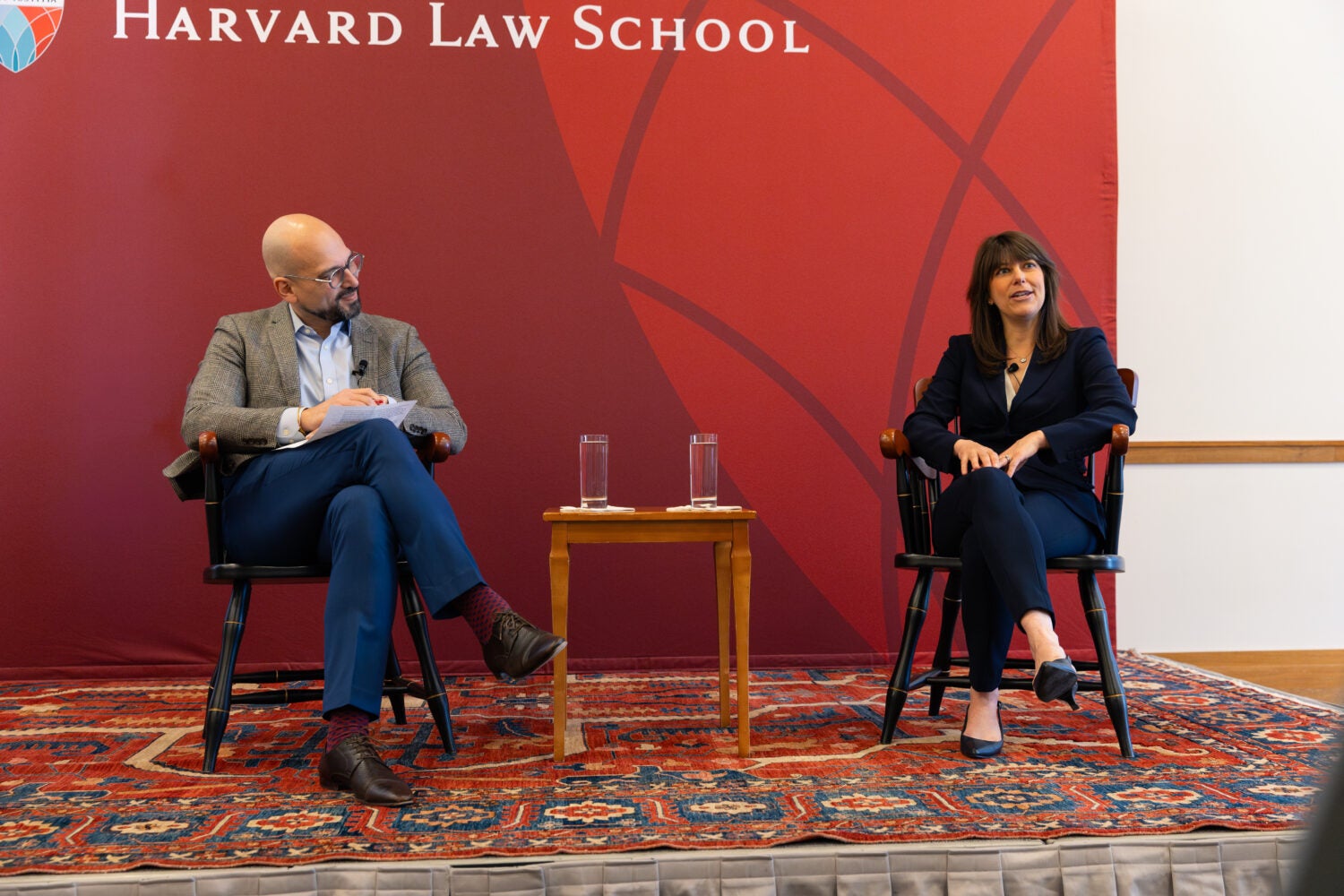By longstanding tradition, the solicitor general of the United States — the federal government’s representative in the Supreme Court — defends nearly every law passed by Congress, even statutes that conflict with the current administration’s policies. But this customary degree of independence from the rest of the White House could be at risk moving forward, argued Elizabeth Prelogar ’08 at a Harvard Law School event last week.
“There’s an element of defending the client’s interests that extends to defending Congress’s work, and that can create some challenging situations,” said Prelogar, who served under President Joe Biden as the 48th solicitor general. Prelogar is currently the Steven and Maureen Klinsky Visiting Professor of Practice for Leadership and Progress at Harvard Law.
As part of Harvard Law’s Klinsky Lecture series, Prelogar sat for a conversation last week with her law school classmate, Andrew Crespo ’08, the Morris Wasserstein Public Interest Professor of Law, before an overflow audience of faculty, students, and staff. Over the course of nearly an hour, the nation’s former top litigator explored the evolving norms around the Solicitor General’s role, the highs and lows of her tenure, and the ways in which the legal community can work together to uphold the rule of law.

Crespo opened the discussion by asking Prelogar to describe the full scope of the solicitor general’s role.
Prelogar replied that there is “much more to the job than standing up in the Supreme Court and arguing cases.” She added that she views the work as fitting into three categories.
The first, Prelogar continued, is Supreme Court merits work. In most cases, the federal government participates either as a litigant or as an amicus, a friend of the court, she said.
On the former set of cases, it is usually clear what position the solicitor general will take. But when the government weighs in as an amicus, she said, “There is an enormous amount of behind-the-scenes work that goes into figuring out, ‘is this a case where the United States has a substantial interest and should come in,’ and then critically, ‘what should we come in to say?’”
Because there are often many different federal stakeholders in a case, often with different or even competing interests, she said, there is generally “substantial debate about what legal position in the case will best serve the interest of the United States as a whole.”
A second, less well-known part of the solicitor general’s role is to manage the U.S. Department of Justice’s appellate strategy throughout the country, Prelogar continued. “Any time the federal government loses on an issue anywhere and there’s an interest in seeking further review, you have to get personal authorization from the solicitor general.”
Here again, the answer isn’t always clear cut, she said, and depends on the quality of legal arguments and what could ultimately result from a more favorable ruling on appeal. “Are we going to take this bad district court decision and turn it into an even worse circuit court precedent?”
Finally, she said, the solicitor general acts as an advisor and consultant to others in the executive branch, helping federal agencies craft policies that can survive judicial challenges.
Crespo wondered about how Prelogar thought about who her “client” was in each of these roles, given the variety of competing interests. “Do you actually have a conception of a client in mind that you’re acting as an agent on behalf of, or a fiduciary of, or is the United States so abstract in its interest that this really just means your job is to be a decision-maker in some way?”

“I definitely thought of myself as having a client, and the client was the United States of America,” Prelogar replied. “The United States is a special entity, but it’s not like it has abstract interests. It has very concrete interests in advancing the policies of administrative agencies and allowing those to take effect, in upholding the rule of law, and protecting the rights of citizens.”
Defending acts of Congress against constitutional challenges, unless there are no reasonable arguments available, is an important and time-honored norm at the Department of Justice, said Prelogar. That is true, she added, even when the law in question was signed or endorsed by a previous president. The only exception to this norm, she noted, comes “in situations where Congress’s statute encroaches on the interests of the presidency.”
But this established approach to the rule of law might be changing under the current presidential administration, the two Harvard Law professors suggested.
“It’s very hard for me to imagine today the solicitor general filing a brief that says, ‘the president doesn’t like this policy position, but this is the law,’” Crespo replied.
Prelogar agreed. “It does seem like there is a different conception of the relationship that should exist between the White House and the Department of Justice,” she said, adding that it was another existing norm that her position had a degree of independence and did not exist to “do the president’s bidding.”
“I think that if those lines get taken down, and if it actually becomes necessary for the Department of Justice to do whatever the president says, and he ends up saying a lot, then that is going to very much change the role of the Department of Justice,” she argued.
Crespo then asked Prelogar to describe some of her proudest — and most disappointing — moments as solicitor general.
Prelogar said her favorite cases were those related to “protecting democracy,” such as Allen v. Milligan, in which the Court confirmed that a redrawn district map by the state of Alabama violated the Voting Rights Act. She said she was also proud to have participated in Moore v. Harper, which rejected the so-called independent state legislature theory, as well as U.S. v. Rahimi, which upheld the constitutionality of a federal law prohibiting someone under a civil domestic violence restraining order from possessing a gun.
But Prelogar conceded that there had been some disappointments, too. “Probably the toughest day for me was the day I argued Dobbs [v. Jackson Women’s Health Organization],” she said. Oral arguments had to be delivered to a nearly empty courtroom because of COVID, she recalled, and the justices, “through their questions, signaled where they were going with the eventual decision.”
“That was really hard, because so many cases that I argue have a lot of impact on the nation and on citizens, but this is one that involved the Court retreating from, and overruling, a right that had existed for my entire lifetime, for an entire generation, and I felt very distinctly how profound those stakes were for the nation,” Prelogar said.
“We’re at an incredibly consequential moment in our country, in our constitutional order, in our democracy.”
When asked to pinpoint broader trends in the Supreme Court, Prelogar identified the increased use of the emergency docket as one such change.
Another is the Court’s approach to administrative law, as signaled by its overruling of Chevron deference and the emergence of the major questions doctrine, she argued. “I think that the Court’s recent changes in that area are going to have ramifications and ripple effects that are still being established but will represent a dramatic doctrinal shift.”
Crespo then turned to the current moment, in which many of President Donald Trump’s initiatives are being tested in the judiciary, including the nation’s highest court.
“What are you looking for, what are you hoping for, what are you expecting … as indications of how the Court’s going to confront what I suspect most of the justices … think of as the most consequential years that the Court may have had to face?” he asked.
“We’re at an incredibly consequential moment in our country, in our constitutional order, in our democracy,” Prelogar agreed, arguing that the executive branch is making broad claims to power that are so far unchecked by Congress.
Prelogar said the Supreme Court itself is in something of a holding pattern. “The Court seems to be in a posture of not wanting to insert itself too soon and in too big a way.”
Cases that may have seemed like wins for the current administration have mainly been decisions on technical or procedural grounds, she continued.
“The Court has not taken on the merits of those cases and looked at the underlying legality of executive actions,” she said. “I think that that shows the Court being cautious. … I think maybe the Court doesn’t want to take on some of these fundamental questions in an emergency posture.” Instead, the justices might choose to wait until they arrive before the Court through a more typical appellate process, she suggested.
“It has been key in our society and in our democracy to hold the executive to account … I think this is a moment to stand up.”
The big question, Prelogar said, is what happens when the justices are forced to decide on the legal merits of a case. “I would expect that the Court is not going to pull its punches and it’s going to fulfill its duty under Article III.”
Finally, Crespo asked what Prelogar thinks about the current administration’s attacks on the legal profession.
Here, Prelogar referenced a saying by her former boss, Attorney General Merrick Garland ’77, who, she recounted, would speak again and again about the “importance of the rule of law.” “As he always put it, the foundation of the rule of law is treating like cases alike. It’s a principle of equal justice under the law. We don’t have one rule for friends and another for foes, one rule for Republicans and another for Democrats, one for the rich and one for the poor, one for the powerful and one for the powerless. It’s about treating like cases alike and holding fast to those rule-of-law principles.”
So, what is the solution when these principles are tested? Law firms, legal institutions, and others with power need to band together to stand up for them, Prelogar said.
“It has been key in our society and in our democracy to hold the executive to account,” she said. “I think this is a moment to stand up.”
Want to stay up to date with Harvard Law Today? Sign up for our weekly newsletter.
